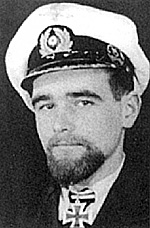 Hans-Georg Hess, born in 1923, became the youngest U-boat commander of WWII when he became captain of U-995 in 1944. At the age of 21, and during the late war years when Allied anti-submarine warfare became increasingly effective, he led his crew on five patrols, receiving a Knight's Cross for his prowess at sinking merchant ships--and returning back to base. Before that, he was a lieutenant aboard U-446. As a guest of Sharkhunters, a WWII submarine society, he spoke at Celebrate History 1999, delivering his seminar mostly in German while his son translated the prepared remarks and the answers to audience questions.
Hans-Georg Hess, born in 1923, became the youngest U-boat commander of WWII when he became captain of U-995 in 1944. At the age of 21, and during the late war years when Allied anti-submarine warfare became increasingly effective, he led his crew on five patrols, receiving a Knight's Cross for his prowess at sinking merchant ships--and returning back to base. Before that, he was a lieutenant aboard U-446. As a guest of Sharkhunters, a WWII submarine society, he spoke at Celebrate History 1999, delivering his seminar mostly in German while his son translated the prepared remarks and the answers to audience questions.
Hans-Georg Hess
In April of 1945, he rode with Admiral Doenitz, the head of the German Navy and soon to be leader of Germany, in the back of a Mercedes as Doenitz transferred his headquarters from Berlin to the north. Hess' U-boat was in for snorkel repairs and Doenitz wanted a report on the tactical aspects of U-boat attacks and defense. There were two things Hess clearly remembers from that trip.
The first was that Doenitz wanted to extend the war so he could boat-lift three million Germans trapped behind Soviet lines, primarily in Prussia and various Baltic ports. Hess' esteem of Doenitz, already high, went up another notch.
The second was that Doenitz had opened negotiations with the Allies to form a joint force to push the Soviets out of Germany. Hess opined that the war had gone on for too long for that to occur.
In the end, the first was accomplished, the second not.
Food and Comfort
The food aboard U-boats was quite good, especially compared to that served soldiers on the Eastern front, Hess noted. Although U-boats had no amenities such as heating and air conditioning, some creature comforts could be created by the engineers. For example, hot sea water for showers could be attained with a strategically placed valve that tapped into the water circulation system. Sailors took showers sitting in a basin, which was uncomfortable, but better than no showers at all. Hess noted that U-boats on patrol in the Indian Ocean would often race into a squall line and bring the sailors up on deck in small groups to shower in the fresh rain.
Space was tight. Sailors "hot bunked," that is, two sailors shared a single bunk. One slept while the other was on duty.
Once, while on patrol in the Caribbean, his U-boat was surpised and attacked on the surface by a low-flying B-25. The bombs missed the U-boat and some of the crew were wounded from the plane's strafing machine guns, but one of the sailors manned the AA gun and managed to shoot down the bomber. Fortunately for the wounded, there was a full-fledged doctor on board the U-boat to patch them up. After 1943, with Allied bomber attacks on German cities on the increase, the doctors were pulled off the boats and sent back home to treat the enormous number of civilian casualties.
Sabotage
On the topic of sabotage, Hess noted that he never had a problem per se, but being based in Norway, sabotage as a whole was not too bad. Now, French sabotage, that was another story. A popular WWI U-boat veteran was initially the liaison between the Navy and the French dock workers. Under his control, the French were treated well and the Germans were winning the war. Unfortunately for the German Navy, the popular veteran was killed in a plane crash and replaced with a political toady who quickly became unpopular. As the tide of war changed against the Germans, it seemed that every French worker wanted to be a member of the Resistance.
A favorite tactic was to drill a quarter inch hole in the top of the fuel tanks, then plug it with something that would slowly dissolve under water. As the submarine left port and began its patrol, this plug would disintegrate, allowing fuel to escape out this hole--leaving a trail on the surface for British planes to spot, track, and destroy. Evidently, there was one particular U-boat that was plagued by such sabotage, including metal filings in pumps, etc., that it spent a lot of time in drydock. Some wag hung a banner labeling the submarine pen as that U-boat's "hunting ground." The commander eventually committed suicide.
Das Boot
What did Hess think of the movie, Das Boot? Actually, he gave it a favorable review, noting that it was generally accurate--although on occasion overly dramatic. For example, although he personally did not see any episodes of nervous breakdowns while serving on his U-boats, he did recall it did happen on rare occasions. One such episode concerned a U-boat on patrol in the Indian Ocean, where one of the sailors became uncontrollable during a depth charge attack and had to be "silenced."
One question was posed to Hess' son: did your father talk about the war? He answered that it wasn't much, but that as he's grown older, he's become more talkative.
Conclusion
The German government is increasingly hostile to its veterans of WWII, making them feel like pariahs over 50 years after their service. For example, Knights Cross holders [like Hess] cannot officially visit military bases, and the idea of holding a WWII symposium such as Celebrate History is virtually unheard of. In another example, the holders of the Knights Cross have an organization that lays a wreath in a public cememtery annually--except for last year, it was prohibited. It was only through the efforts of a local minister that the ceremony could be held in a private church. After the war, Hess spent one year and three months in a Norwegian jail, and then became a lawyer and doctor of law. Hess thanks the organizers of CH for the opportunity to discuss the war years.
Hess concluded much as he began, with the idea that historical information should be shared, not forgotten, and that erstwhile enemies can become friends.
Hans-Georg Hess (far right), youngest U-Boat captain of WWII, with his son (middle) and Harry Cooper (podium) discuss submarine warfare.

Back to MWAN #102 Table of Contents
Back to MWAN List of Issues
Back to MagWeb Magazine List
© Copyright 1999 Hal Thinglum
This article appears in MagWeb (Magazine Web) on the Internet World Wide Web.
Other military history articles and gaming articles are available at http://www.magweb.com